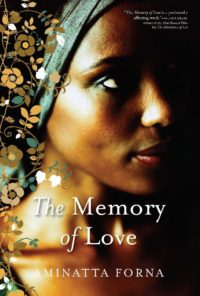He would name, classify and diagnose every nuance of the human soul
 The Memory of Love
The Memory of Love
by Aminatta Forna
I can’t remember how this book made its way onto my TBR, but I picked it up thanks to the Books on the Nightstand Book Bingo, which for me includes the square “Set in Africa”. If not for that I might have avoided this for a long time, expecting a dark, disturbing read. It’s not quite what I expected.
The book has dark, disturbing moments for sure. It is set in Freetown, Sierra Leone’s capital, post civil war, pre Ebola, so approximately when it was written (this book was published in 2010 so presumably written in about 2008). The civil war is a scar for the native characters, creating a distance that can never be breached by the primary non-native character, a white British doctor.
Adrian Lockheart is a psychologist on secondment to Sierra Leone. It is his second assignment to Africa, and he spends much of the novel dwelling on his reasons for being there. He has a wife and daughter back home in England, but his marriage is failing and over the years he has lost the feeling that he is actually helping his patients.
But at least at home he had patients. At first, his only regular patient in Freetown is a dying man. Elias Cole just needs someone to talk to and Adrian is happy to comply. The old man’s memories form a second thread through the novel. Cole tells the tale of how he met the love of his life, Saffia, who unfortunately for him was married to a colleague of his at the university. The story of his love begins in 1969, with the Apollo missions key early events. But slowly the reality of living in a military dictatorship intervenes, and the tale of Cole’s love for Saffia is inextricably linked with political and moral choices that Adrian doesn’t fully understand.
“A change in the season. Surreptitious at first. At night the rain tapped on the windowpanes, scores of hesitant fingers. Dawn brought bright skies, washed of the desert dust, and the hard, coppery smell of earth. For the first time in months you had a clear view of the hills from the city. As the weeks passed, the rain became emboldened, abandoned by the sanctuary of night, and came by day, blindingly, accompanied by dark clouds.”
Adrian, meanwhile, starts to make friends in Freetown and find his own place there. His first friend is Kai, a local surgeon who shows up on his doorstep night after night and introduces him to the city, but who is reticent about the past. Then Adrian offers his services at the local psychiatric facility and there befriends Ileana, a fellow psychologist from Romania, who has made her home in Sierra Leone, living peacefully on the beach with her dogs. Adrian finally sees a place where he can help, and even how he can advance his own career there.
Although the stories alternate, and Kai’s back story is also filled in later, this really is Adrian’s story. His struggle to understand Sierra Leone, to find out what happened to people to cause the scars that they carry, is genuine, despite repeated accusations that it’s just white guilt, that he’ll soon be gone. He begins awkwardly, failing to judge situations right, to ask the right questions, but then he starts to get it.
And then he falls in love and, like a teenager, that’s all he can think about. I actually got frustrated with Adrian at this point, because he was just starting to prove his detractors wrong, and then he goes and follows this inevitable path.
“How does a man like him believe in love? A man trained to analyse the component parts of emotion… He who would name, classify and diagnose every nuance of the human soul into attachments, complexes, conditions and disorders. There exists, somewhere, a scale for love invented by one of his profession. Others have identified the neurological reward pathways of the brain, the tripwires that mark the way to love. And there are others still who say love is but a beautiful form of madness.”
Ultimately this book is about love lost and found, as much as it is about the human kindness that needs to follow great shared trauma such as civil war. There are some truly horrific stories unearthed and for many people the healing has yet to begin.
There are reveals that are held back, creating a thriller-like quality at times in the race to find out the truth. But this also means the book suffers some of the faults that thrillers can suffer. There are more coincidences than I was sure I could believe in, twists that I saw coming because they were too neat. I also didn’t love the ending, but that might be because I had foolishly re-read the blurb and figured out where the storylines would lead. (Why do blurb writers give so much away? Anything in the second half of the book should be off-limits, but especially the last 50 pages.)
The writing is beautiful and the level of detail well-judged. I was moved, shocked and moved again. I also feel I learned at least a little about Sierra Leone, a country that until now I only associated with mining diamonds. I’m very curious to read Forna’s previous novel Ancestor Stones, about four women born to four different wives of a plantation owner in Africa. I suspect it will be similarly illuminating.
Published 2010 by Bloomsbury.
Winner of the Commonwealth Writers’ Prize for Best Book.
Shortlisted for the Orange Prize for Women’s Fiction.
Source: Foyles.